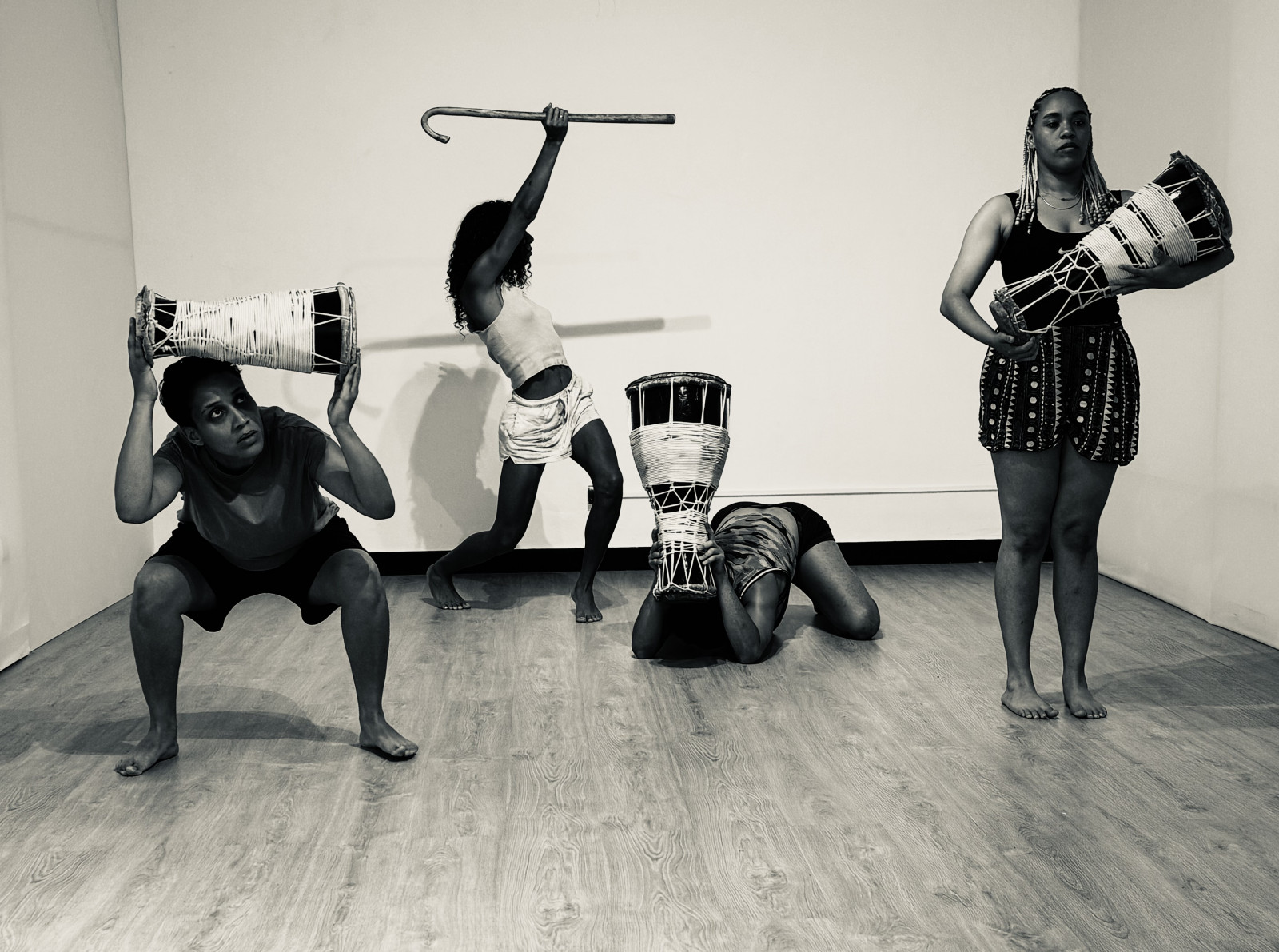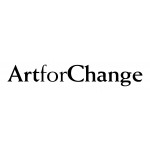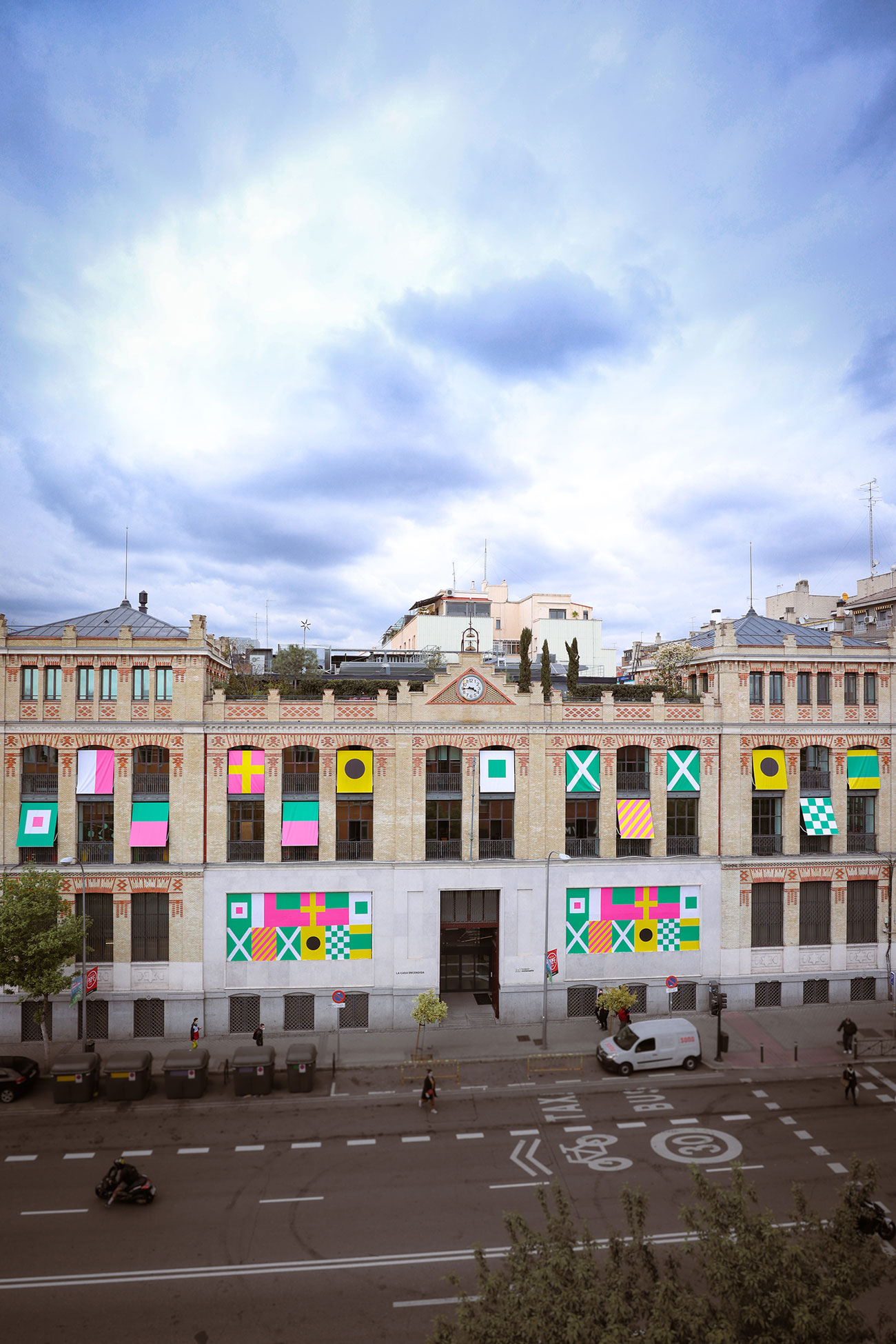Eyilá Ashé Ebbora, by José R. Hernández y Osikán
Within the programming of
Ídem 2024. International Performing Arts Festival| Target audience: | General public |
| Duration: | 1 hour |
| Price: | 5€ and 10€ |
| Location: | Patio |
Idem 2023 ends with the première of this project that opens with the question “Where does the political strength of our spirituality lie?” and is developed with communities excluded from the social arena by choice or external imposition: Afro, migrant, trans and racialised people.
Eyilá means “candle” in the Yoruba language and is the sign for number twelve in the Diloggún (the divination system in the Osha Ifa Rule). Eyilá is the second part of the Opira series of Osikán-Vivero de creación, which began in Havana in 2019 with the work Okana - ritual afroRadioactivo and which explores Afro-descendant rituals and the mythological and philosophical tenets that underpin them, challenging the notions of representation and performativity.
Eyilá ashé ebbora constructs a myth of collective resistance.
Twelve sacrifices are performed.
Twelve pieces of advice are offered.
Twelve offerings are presented.
Twelve female warriors are blessed.
Eyilá tells the story of the sun; it speaks of the power of air and water.
Eyilá is the land calling to the animals in the form of a song, a sign that they are mature enough and strong enough to emigrate.
Eyilá tells the story of the first jimaguas (twins) born through the fault of the yam and fire, and killed in the belief that they were a curse and the children of monkeys.
Eyilá speaks of the recognition of the drum, of the power of music and dance to preserve harmony in the community and defy death.
Eyilá speaks of collective resistance and totalitarian regimes that steal from peoples.
Eyilá listens to the stars talk about revolutions and dictatorships.
Eyilá looks to the Caribbean, to Haiti and its revolution, and to the dictatorships that exist today.
Eyilá seals pacts before the fire.
It speaks of collective wisdom and the power of coal to cure physical and spiritual illnesses.
Eyilá is the candle in the mouth of Shangó, in the mouth of Cacao, of Malvin, of Sofía, of Euyín, of Adriana, of Yohayna, of Ignacio, of Yunieski.
It is the candle of my broken heart.
It is the candle of our migrant and trans communities of the Global South who dance and sing with the choir of maroons and witches who come from the lands of the mountains to live in this Global North.
Eyilá is about singing and loving and eating in the moonlight, surrounded by candles while waiting for the sun.
José Ramón Hernández
José Ramón is an Afro-Cuban interdisciplinary artist who trained at the Instituto Superior de Arte in Cuba. He is the founder and artistic director of Osikán-Vivero de creación and of the Afronteriza Residency at the Centro Cultural Espacio Afro in Madrid. His practice encompasses artistic direction, dramaturgy, choreography, curation, installation, performance, education, mediation and cultural management. He is a spiritualist, babalocha (priest of the Osha Ifa Rule) and practitioner of the Palo religion.
His creative research focuses on Afro-descendant rituals, performativities, peripheral bodies, matter in its various forms, spiritualities, memories, migrations, cartographies and desires. He experiments with the boundaries between fiction and reality, working with non-fictional documents and tools of the sensitive to affect and intervene in social processes and communities.
He received the Circuito de las Artes Plásticas award from the Region of Madrid in 2022 for his installation Ojú inú yàrá; the Villanueva Critics award (National Union of Cuban Artists UNEAC and International Theatre Critics Association) and the Aire Frío award (Young Writers and Artists of Cuba Association) for the 2016 work BaqueStriBois; and first prize at the 2006 edition of La Fiesta de las relaciones for the Maferefún pa Antonia.
His work has been shown in Cuba, Mexico, Chile, Dominican Republic, Canada, Germany, Belgium, United States, Brazil and Spain.
Malvin Montero (Santo Domingo, Dominican Republic). Malvin began his dance studies in 2003 at the Conservatorio de Danza Alina Abreu, graduating from the Escuela Nacional de Danza de Bellas Artes (Endanza) and Pro Danza (Havana). He has a degree in choreography and dance from the Universidad Rey Juan Carlos ISDAl (Madrid). Malvin creates, dances and directs. Trained by the composer Chefa Alonso, his extensive career includes classical academic dance, contemporary dance and free improvisation. One of the cruxes of his creative work is reflecting on diasporic corporality and its imaginaries.
Cacao Díaz. Cacao is an Afro-descendant artist, performer and singer who uses the body to articulate different living and performing arts disciplines. Harnessing all of these resources, they construct narratives and vibrations based on their lived experience as a migrant and a trans body. A member of the Tinta Negra collective, they are active on the Spanish ballroom scene and the Kiki House of Laveaux scene. They connect ballroom culture with affective communities of sexual dissidents and migrants within the Don’t Hit a la Negrx collective.
Euyín Eugene. A trans man born in Petare, Caracas, Venezuela, Euyín is a visual and stage creator. Their work revolves around processes that blend embodied experience with the political and social events that condition that experience. Power, migration, gender and historical memory are the themes they address.
Sofía Perdomo Sanz (Caracas, 1995). A migrant, self-managed creator and Caribbean-focused artist of the poetic and the political, Sofía works with what she has and turns it into a political stance: we do not require anything other than what we already have to express the story we need to tell. She explores her topics through writing, visual art and performance. Memory, the syncretism of Afro-diasporic identities, migration and healing as an essential quest and urge are recurring themes in her works.
Yunieski Gil. A percussionist musician who graduated from the Escuela Nacional de Arte de Cuba, Yunieski has played with different bands that accompany Afro-Cuban folk dance groups, including Sarabanda Ngo, Lucero Cuatro Nsila, the Stild Band of Havana and Yibi Son. He has been a member of the AfroResistencias research team at Osikán-Vivero de creación since 2023.
Ignacio Calderón. Ignacio is a percussionist with 20 years of international professional experience. He is the former music director of the Afrocuba de Matanzas folk group and has played with artists like Chucho Valdés and Kervin Barreto (Calle 13). An expert in Afro-Cuban, Latin and Afro-Caribbean beats and fusion music (jazz, flamenco, electronic and world music), he is a Latin and Afro-Cuban percussion instructor (United Kingdom, US, Spain, Mexico). He has been a member of the AfroResistencias research team at Osikán-Vivero de creación since 2023.
Adriana Reyes. An anthropologist and creator in the field of the living arts, Adriana has a master’s degree in feminist studies, specialising in sexualities and diversities. She has trained with various female creators in Spain, Brazil and Portugal. Her fields of interest are the social sciences, the living arts, trans-feminist studies, spiritualities and non-human forms of life, diverse areas that also represent modes of pleasure and action in her daily practice.
Yohayna Hernández. A dramaturgist with Osikán-Vivero de creación, Yohayna is interested in the relationship between research, creation and theory. She was the co-coordinator of the Tubo de Ensayo research-creation networks (2006–2012) and the Laboratorio Escénico de Experimentación Social (LEES, 2012–2020) in Cuba, dividing her practice between teaching (Universidad de las Artes de Cuba) and publishing (chief editor of Tablas, the specialised magazine for the performing arts). Since arriving in Montreal in 2019, she has worked as an associate dramaturgist at LA SERRE – arts vivants (2019–2020) and co-coordinated and co-mediated the Dramaturgy Clinics at Festival TransAmériques/FTA, an international theatre and dance event.
As a freelance dramaturgist, she has contributed to different stage creations in Montreal, Berlin, Havana and Madrid, including Nigamon/Tunai by Émilie Monnet and Waira Nina, Fausse balle by Charles Dauphinais and Ariana Pirela Sánchez, Luz: terre by Sonia Busto, Granma, trombones de La Habana by Rimini Protokoll, and I love Madrid and BaqueStriBois by José Ramón Hernández Suárez (Osikán-Vivero de Creación).
She is currently a member of the editorial board of the art and politics magazine Liberté (director of the critical notebooks on the performing arts) and is studying for a PhD in literature at the University of Montreal. She writes about and conducts research on listening dramaturgies.
*Reduced admission for under 30s, seniors over 65 and the unemployed, upon presentation of proof.
Show and artist information
A creation by José Ramón Hernández and Osikán-Vivero de creación in association with Cacao Díaz, Euyin Eugene, Sofía Perdomo, Malvin Starlin Montero, Yohayna Hernández, Ignacio Calderón, Yunieski Gil and Adriana Reyes
With the support of: Art for Change of Fundación “la Caixa”, Residencias Paraíso (RPM collective) and a grant from the Visitors Programme for the Internationalisation of Spanish Culture (PICE, Acción Cultural Española-AC/E)



